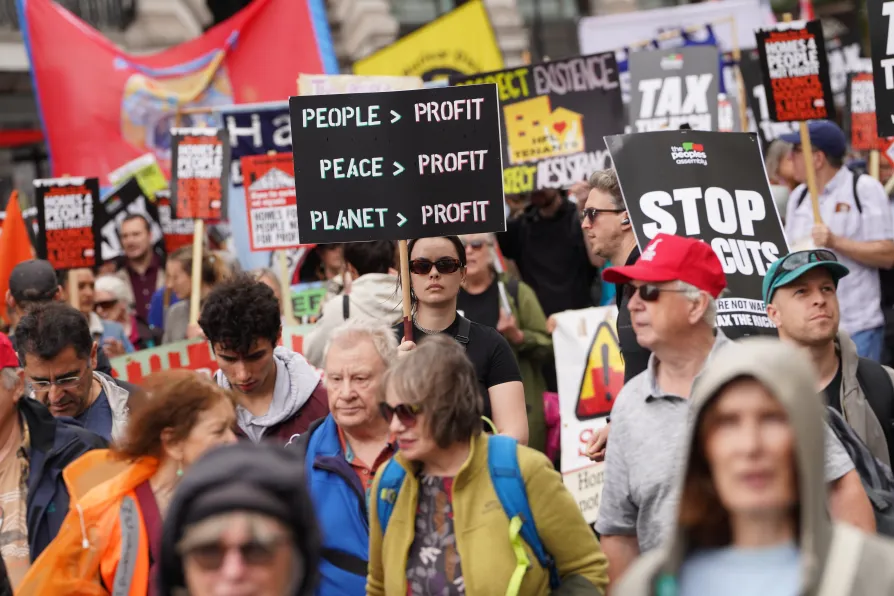
 People attending the People's Assembly Against Austerity protest in central London, June 7, 2025
People attending the People's Assembly Against Austerity protest in central London, June 7, 2025
BRITAIN’S Communists meet tomorrow in Yorkshire for their 58th Congress. They will debate the urgent challenges faced by the left across the nations of Britain and more widely across the world.
Reactionary nationalism and racism, accelerated militarism and the abandonment of commitments on global warming all demand a new level of unity, a united front, not just as a slogan, but as a unifying solidarity across our communities and the organised labour movement.
How to secure that unity is a question that both unites but also sometimes divides the wider left. It is certainly not one that will be currently resolved by thinking purely in terms of political parties.
It demands instead an understanding of the material challenges that face people in their daily lives of work, of learning, finding futures and raising children — but one which also seeks the underlying causes that can unify.
Why have resident doctors in England just found it necessary to walk out over inadequate pay — along with security officers at the Bank of England and benefit staff in the north?
What miseries have befallen the tens of thousands of indigenous people in Brazil since the collapse, nine years ago, of the dam built by British mining companies which wiped out their homes and poisoned their children — only yesterday, after nine years, found liable at the High Court in London and still only at the very first stage of compensation?
It is perhaps trite to say it is capitalism. Yet that’s the system we have. Today its inflated capital values demand profit payment at a time when actual investment is near zero. The big investment banks that own and control our economy now look to governments to give them the taxes that should be used for hospitals and care homes in order to repair the infrastructures they have destroyed and, far worse, for the development of armaments that they then sell back to governments.
Ahead of this month’s Budget their newspapers and other media are already telling us we must tighten our belts. In doing so, deliberately or not, they are providing the arguments that are enabling Reform to emerge as this country’s biggest party. And it does so on a platform that blatantly seeks to divide working people by scapegoating the most vulnerable and making them the cause of homelessness and unemployment.
This is why the “united front” we need must be not just a slogan but a movement, one that can mobilise in detail, win collective action and explain. Trade unions, as previously, have to form its basis. But that requires relearning the lessons of the past: of mutual solidarity and support.
It also means being where people are — in communities, many different kinds of community. This is indeed where a big majority of today’s trade unionists actually work: delivering public services from education to health, transport, social care and the environment. But, as in the past, it also requires a local organising focus as supplied by trades union councils and tenants’ and housing movements and a political push whether by the People’s Assembly or some similar organisation.
With a few important exceptions, such organising work has hardly begun. The defeat of Reform will not be achieved by street battles — even if its mobilisations will need to be challenged. It will be by tackling issues as they confront people locally, winning often small victories, explaining causes but also by continually building wider movements of solidarity.
The politics of class have to be there. But it is a class that has to be understood as one that is far bigger and more diverse than before — even if the challenges it now faces are much more dangerous.

ROZ FOYER explains the significance and tradition of today’s St Andrew’s Day March and Rally

The CPB's congress aims to build the united front against monopoly capitalism, utilising the YCL’s promising new generation of militants — but our party remains far from the strength history requires of it, despite recent progress, writes JOHNNIE HUNTER

The left must avoid shouting ‘racist’ and explain that the socialist alternative would benefit all











